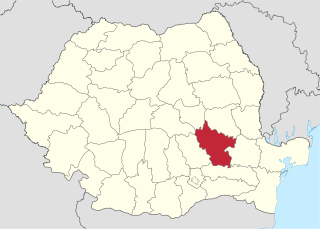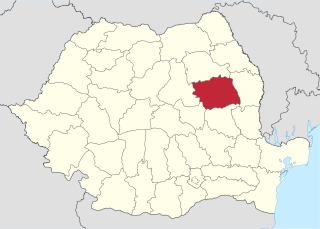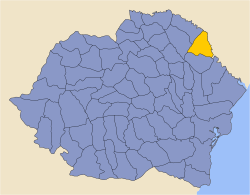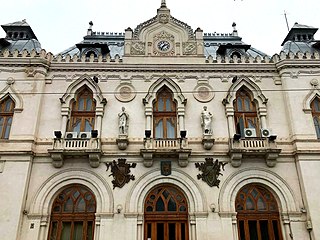
Neamț County is a county (județ) of Romania, in the historic region of Moldavia, with the county seat at Piatra Neamț.
The 41 județe and the municipality of Bucharest comprise the official administrative divisions of Romania. They also represent the European Union' s NUTS-3 geocode statistical subdivision scheme of Romania.

Botoșani County is a county (județ) of Romania, in Western Moldavia, with the capital city at Botoșani.

Buzău County is a county (județ) of Romania, in the historical region Muntenia, with the capital city at Buzău.

Vaslui County is a county (județ) of Romania, in the historical region Western Moldavia, with the seat at Vaslui.

Suceava County is a county of Romania. Most of its territory lies in the southern portion of the historical region of Bukovina, while the remainder forms part of Western Moldavia proper. The county seat is Suceava.

Bacău County is a county (județ) of Romania, in Western Moldavia, with its capital city at Bacău. It has one commune, Ghimeș-Făget, in Transylvania.
Regiunea Bacău was one of the newly established administrative divisions of the People's Republic of Romania, copied after the Soviet style of territorial organisation.
Regiunea Bârlad was one of the newly established administrative divisions of the People's Republic of Romania, copied after the Soviet style of territorial organisation.

Tutova County is one of the historic counties of Moldavia, Romania with the city of Bârlad as capital.

Orhei was a county in the Kingdom of Romania between 1925 and 1938, and again between 1941 and 1944, with the seat at Orhei.

This article discusses the administrative divisions of the Kingdom of Romania between 1941 and 1944. As a result of the Soviet occupation of Bessarabia and Northern Bukovina, Second Vienna Award and the Treaty of Craiova, territories that had previously been part of Romania were lost to the Soviet Union, Hungary and Bulgaria respectively. By September 1940 the administrative system set up in 1938 based on 'ținuturi' (regions) was disbanded and the former counties (județe) were reintroduced.

Putna County was a county in the Kingdom of Romania, in southern Moldavia. The county seat was Focșani.

Ismail County was a county (județ) of Romania, in Bessarabia, with the capital city at Ismail.

Baia County is one of the historic counties of Moldavia, Romania. The county seat was Fălticeni.

Covurlui County is one of the historic counties of Moldavia, Romania. The county seat was Galați.

Râmnicu Sărat County is one of the historic counties of Muntenia, Romania. The county seat was Râmnicu Sărat.

Roman County is one of the historic counties of Moldavia, Romania. The county seat was Roman.

Trei Scaune County is one of the historical counties of the Kingdom of Romania, in the historical region of Transylvania. The county seat was Sfântu Gheorghe.

Cahul County was a county of the Kingdom of Romania, in the historical region of Bessarabia, the successor of Cahul County.





















